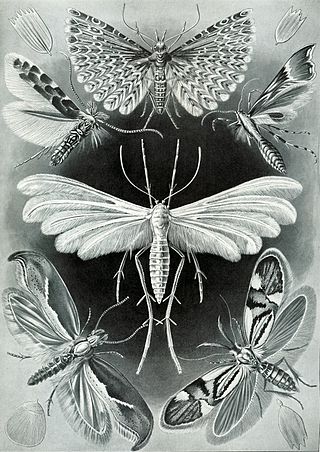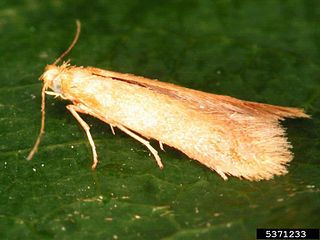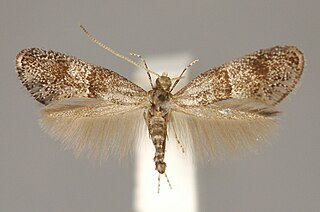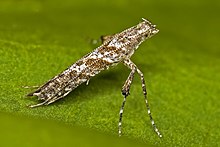
Microlepidoptera (micromoths) is an artificial grouping of moth families, commonly known as the "smaller moths". These generally have wingspans of under 20 mm, so are harder to identify by external phenotypic markings than macrolepidoptera. They present some lifestyles that the larger Lepidoptera do not have, but this is not an identifying mark. Some hobbyists further divide this group into separate groups, such as leaf miners or rollers, stem or root borers, and then usually follow the more rigorous scientific taxonomy of lepidopterans. Efforts to stabilize the term have usually proven inadequate.

Tischerioidea is the superfamily of "trumpet" leaf miner moths. The superfamily contains just one family, Tischeriidae, and traditionally one genus, Tischeria, but currently three genera are recognised, widespread around the world including South America, except for Australasia. This is one candidate as the sister group of the bulk of Lepidoptera, the Ditrysia, and they have a monotrysian type of female reproductive system. These small moths are leaf-miners in the caterpillar stage, feeding mainly on Fagaceae, Asteraceae, and Malvaceae (Astrotischeria), and some also on Rhamnaceae, Tiliaceae, and Rosaceae.

Tineoidea is the ditrysian superfamily of moths that includes clothes moths, bagworms and relatives. There are six families usually included within it, Eriocottidae, Arrhenophanidae, Lypusidae, Acrolophidae, Tineidae and Psychidae, whose relationships are currently uncertain.

Gracillariidae is an important family of insects in the order Lepidoptera and the principal family of leaf miners that includes several economic, horticultural or recently invasive pest species such as the horse-chestnut leaf miner, Cameraria ohridella.

Douglasiidae is a small Lepidopteran family including around 28 species of micromoth whose adults are collectively called Douglas moths. The largest genus in the family is Tinagma. They are primarily found in the Palearctic and Nearctic realms. The adults have a 6 to 15 mm wingspan, with a reduced hindwing venation and long fringes. The larvae are leaf miners or borers, primarily in stems and petioles, belonging to Boraginaceae, Labiatae, and Rosaceae.
Stigmella maloidica is a moth of the family Nepticulidae. It is only known from Tajikistan.
Stigmella acerna is a moth of the family Nepticulidae. It is found in Turkmenistan.
Stigmella aiderensis is a moth of the family Nepticulidae. It is found in Turkmenistan.
Stigmella caspica is a moth of the family Nepticulidae. It is found in Azerbaijan.
Stigmella ficulnea is a moth of the family Nepticulidae. It is found in Turkmenistan.
Stigmella flavescens is a moth of the family Nepticulidae. It is found in Turkmenistan.
Stigmella hissariella is a moth of the family Nepticulidae. It is found in Tajikistan.
Stigmella klimeschi is a moth of the family Nepticulidae. It is found in Kazakhstan and Tajikistan.
Stigmella kondarai is a moth of the family Nepticulidae. It is found in Tajikistan.
Stigmella kuznetzovi is a moth of the family Nepticulidae. It is found in Turkmenistan.
Stigmella montana is a moth of the family Nepticulidae. It is found in Kazakhstan and Tajikistan.
Stigmella motiekaitisi is a moth of the family Nepticulidae. It is found in Tajikistan.

Gracillariinae are a subfamily of moths which was described by Henry Tibbats Stainton in 1854.






